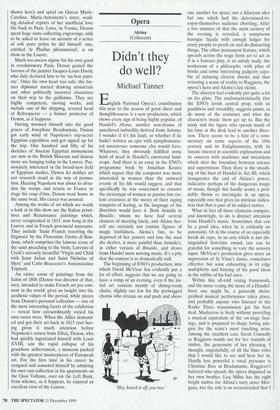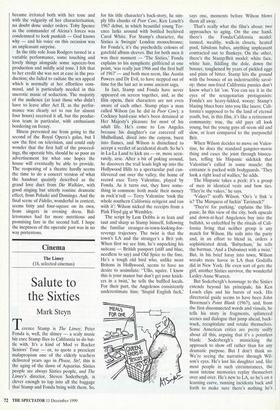Opera
Alcina (Coliseum)
Didn't they do well?
Michael Tanner
English National Opera's contribution this year to the season of good cheer and thoughtlessness is a new production, which shows every sign of being highly popular, of Handel's Alcina, another non-drama of unrelieved imbecility derived from Ariosto. I wonder if it's his fault, or whether if he hadn't written an epic with nymphomania- cal sorceresses someone else would have. Whatever, they obviously fulfilled some kind of need in Handel's emotional land- scape. And there is an essay in the ENO's programme book by Jonathan Keates which argues that the composer was more interested in women than the outward events of his life would suggest, and that specifically he was concerned to counter the stereotype of women as passive but vio- lent creatures at the mercy of their raging tempests of feeling, as the language of the librettists would have it. Both Armida in Rinaldo, whom we have had several chances of meeting lately, and Alcina her- self are certainly not routine figures of magic lustfulness. Alcina's fate, to be deprived of her powers and lose the man she desires, is more painful than Armida's, in either version of Rinaldo, and draws from Handel more moving music. It's a pity that the context is so dramatically null.
The beginning of ENO's production, into which David McVicar has evidently put a lot of effort, suggests that we are going to have a romp of an evening, even if the ini- tial set consists mainly of dining-room chairs, slightly too few for the periwigged chorus who stream on and push and shove Hey, knock it off, you two.'
one another for space; not a hilarious idea but one which had the determined-to- enjoy-themselves audience chortling. After a few minutes of that the main scenery of the evening is revealed, a sumptuous baroque facade with enough ledges for many people to perch on and do distracting things. The other permanent feature, which spreads across the stage from act to act as if in a lonesco play, is an untidy study, the workroom of a philosophe, with piles of books and some interesting gadgetry capa- . ble of inducing electric shocks and thus restoring a sense of reality to Ruggiero, the opera's hero and Alcina's last victim.
The director had evidently put quite a lot on his plate. The uncharacteristically (for the ENO) lavish central prop, with its gaudiness and versatility, suggests panto, as do many of the costumes and what the characters inside them get up to. But the study and the figure who spends much of his time at the desk lead in another direc- tion. There seems to be a hint of a com- mentary on some aspects of the 18th century and its Enlightenment, with its fanatic interest in scientific explanation and its concern with machines and inventions which skirt the boundary between science and superstition. Then there is the smash- ing of the bust of Handel in Act III, which inaugurates the end of Alcina's power, indicative perhaps of the dangerous magic of music, though this hardly seems a prof- itable theme to investigate in an opera, especially one that gives no intrinsic indica- tion that that is part of its subject matter.
What in fact all these elements conspire, and knowingly, to do is distract attention from Handel's music. Sometimes that can be a good idea, when he is evidently on automatic. Or in the course of an especially lavish da capo, in an aria which is not dis- tinguished first-time round, one can be grateful for something to vary the sensory input. McVicar's production gives more an impression of St Vitus's dance, sometimes effective but soon exhausting in its edgy multiplicity and burying of his good ideas in the rubble of his bad ones.
Within this all-told vexing framework, and the more vexing the more of a Handel- lover one might be, a generally distin- guished musical performance takes place, and probably anyone who listened to the Radio Three transmission got the best deal. Mackerras is lively without providing a musical equivalent of the on-stage fuss- ings, and is prepared to shape loving ada- gios for the score's most touching arias. Among the excellent cast, Sarah Connolly as Ruggiero stands out for her warmth of timbre, the generosity of her phrasing. I thought, ungratefully, of all the finer roles that I would like to see and hear her in. Hardly less powerful a vocal presence is Christine Rice as Bradamante, Ruggiero's beloved who spends the opera disguised as her own brother. Lisa Milne has the right bright timbre for Alcina's tarty sister Mar- gana, but the role is so overextended that 1 became irritated both with her tone and with the vulgarity of her characterisation, no doubt done under orders. Toby Spence as the commander of Alcina's forces was condemned to look punkish — God knows why — and his voice on this occasion was an unpleasant surprise.
In the title role Joan Rodgers turned in a variable performance, some touching and lovely things alongside some squeeze-box production and mildly acid tone. I felt that to her credit she was not at ease in the pro- duction; she failed to radiate the sex appeal which is normally at her effortless com- mand, and is particularly needed in this unerotic music of seduction. The majority of the audience (at least those who didn't have to leave after Act II, as the perfor- mance was clearly set to run for almost four hours) received it all, but the produc- tion team in particular, with enthusiasm bordering on frenzy.
Illness prevented me from going to the second of the Royal Opera's galas, but I saw the first on television, and could only wonder that the first half of the proceed- ings, the operatic bits, should be so poor an advertisement for what one hopes the house will eventually be able to provide. The reopening of a theatre hardly seems the time to do a concert version of what the handout quaintly described as the grand love duet from Die Walkiire, with good singing but utterly routine dramatic effect, from Polaski and Domingo. And the final scene of Fidelio, wonderful in context, seems bitty and four-square on its own, from singers in evening dress. Bal- letomanes had far more nutritious and promising fare in the second half. I hope the ineptness of the operatic part was in no way portentous.



























































































 Previous page
Previous page